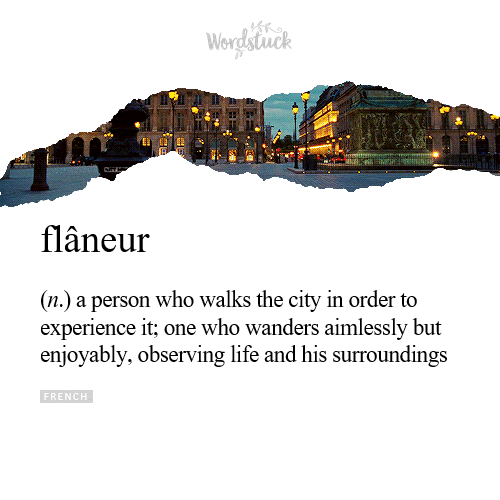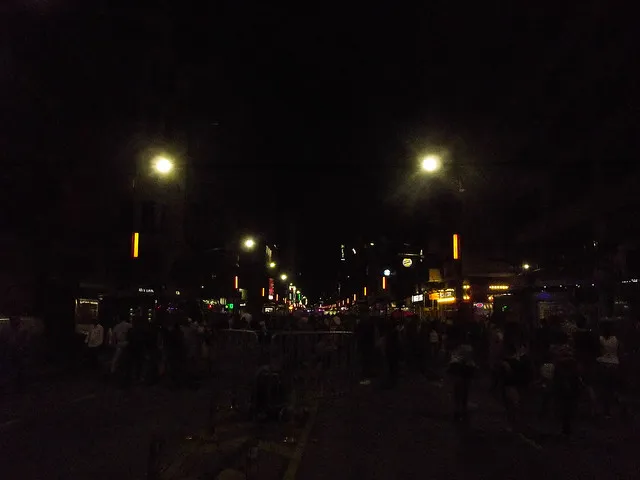Hello peeps! @ailindigo here :)
We're now on the 20th Untranslatable Word and we're going back to France again lol This week's word is one of my always favorite as it's about something I enjoy doing so much.
This week's word is the french: flâneur.

Gif by Wordstuck
flâneur
I was a flâneur even before I knew I was one, I think wandering aimlessly is one of the few pleasure we're able to access to nowadays despite the circumstances. I love walking but the flânerie is even more beautiful.
flâneur derives from the Old Norse verb flana, 'to wander with no purpose'; referring to a person, literally meaning 'stroller', 'lounger', 'saunterer', or 'loafer', but with some nuanced additional meanings. *
This is indeed a beautiful word that refers to all of us people fans of aesthetic experiences and observing. The flâneur is a person who does flânerie, "the act of strolling, with all of its accompanying associations"; traditionally depicted as a man, "a flâneur is an ambivalent figure of urban affluence and modernity, representing the ability to wander detached from society with no other purpose than to be an acute observer of industrialized, contemporary life." * Something I can't help relate myself to, an activity that allows me to connect with my sorroundings and more.
The term dates to the 16th or 17th century, but it was in the 19th century that a rich set of meanings and definitions surrounding the flâneur took shape. In 1872 the Pierre Larousse's Grand dictionnaire universel du XIXe siècle described the flâneur in ambivalent terms, equal parts curiosity and laziness, a description I find very on point. Though, for Victor Fournel there was nothing lazy in flânerie; for him it was, rather, a way of understanding the rich variety of the city landscape; it was like "a mobile and passionate photograph" of urban experience. *
It was Charles Baudelaire, a french poet, who used the term for the first time in 1857 in his book Fleurs du mal (The Flowers of Evil), its most famous work; and later in 1860 he would present a memorable portrait of the flâneur as the artist-poet of the modern metropolis. Then, based on Baudelaire's poetry, Walter Benjamin made this figure the object of scholarly interest in the 20th century, as an emblematic archetype of urban, modern (even modernist) experience; thanks to him the flâneur has become an important symbol for scholars, artists, and writers. *

Zoned out while doing flânerie
As you see, being a flâneur is more than just wandering through the city. The flânerie is a different way of relating to the world and reality, as it consists of consciously exploring every part of the city to the poit of feeling it even as a living entity, moving and watching in an awakened way, focusing on the little details and that stimulating movement and rythm of the city. A flâneur finds joy and a home in the act of getting lost and inmersed in the multitudes while still remaining oblivious, just an observant and therefore mantaining his individuality; he doesn't get involved, he just contemplates. *
He's just a mere observer that goes unnoticed, and in this he finds independence and freedom, just wandering in anonimity, thus putting the city in the spotlight. In the decades since Benjamin, the flâneur has been the subject of a remarkable number of appropriations and interpretations. Benjamin's reflection on the flâneur gave another perspective of it: his flâneur was a sign of the alienation of the city and of capitalism. Also the term has acquired an additional architecture and urban planning sense, referring to passers-by who experience incidental or intentional psychological effects from the design of a structure; and even in photography. *
The flânerie is indeed a vital activity, and I consider myself a flâneur as this activity allows me not only to connect with my sorroundings but a different and enjoyable way to analyze reality and catch on those little details that many might not pay attention to, as it transforms the city into an aesthetic experience. Also there's a sense of rebellion or counterculture in there that gives us a new perception of freedom and wellness, as some say, as a means to boycott the norm by walking without purpose, without consuming, without being merchandise. I think this is something very important nowadays, as we're currently living in a society that with tight schedules, routines and screens makes this concept of contemplative walking very foreign to us.
What do you think? Do you consider yourself a flâneur? Is the flânerie an activity you're able and like to do? Please feel free to let me know what you think in the comments!
Thank you very much for passing by! And if you have an Untranslatable Word you'd like to suggest, please don't hesitate to do so! :)
Previous Untranslatable Words:
#1: Torschlusspanik
#2: Mono no aware
#3: Rasāsvāda
#4: Cavoli riscaldati
#5: Nefelibata
#6: Sturmfrei
#7: Jootha
#8: bilita mpash
#9: resfeber
#10: Vāde mēcum
#11: sankofa
#12: annus mirabilis
#13: voorpret
#14: pikit mata
#15: ranorànilac
#16: gagung
#17: gumusservi
#18: yaourter
#19: nunchi
This content is part of a new series to get more people interested on languages and how they, perception and culture are related!
Exclusively for the Hive Cross Culture Community, the community for language exchange and cross-cultural purposes.
If you'd like to be part of the discussion don't hesitate to hop into the Hive Language and Culture Exchange Discord server! As well as subscribing to the Hive Cross Culture Community so you don't miss any new word comming ;) We'll be sharing a new Untranslatable Word each week!
